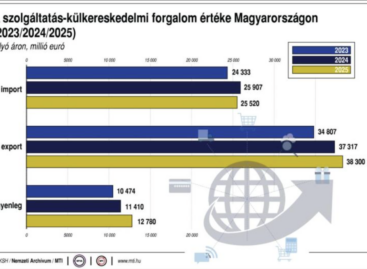MNB Director: The central bank expects 4.7 percent annual inflation this year
Inflation is expected to exceed the central bank’s tolerance band for the remainder of 2025, with inflation forecast at 4.7 percent this year, and the rate of price increases could reach 4 percent again in early 2026 and reach the 3 percent inflation target in early 2027, said András Balatoni, director of economic forecasts and analyses at the Hungarian National Bank (MNB), at a press conference on Thursday to present the June inflation report.
 According to the MNB report, in the medium term, buoyant consumer demand, volatile commodity market movements and persistently strong wage dynamics will accelerate underlying inflationary processes. According to the forecasts, the consumer price index could reach 3.7 percent in 2026 and 3.0 percent in 2027.
According to the MNB report, in the medium term, buoyant consumer demand, volatile commodity market movements and persistently strong wage dynamics will accelerate underlying inflationary processes. According to the forecasts, the consumer price index could reach 3.7 percent in 2026 and 3.0 percent in 2027.
Regarding GDP, GDP growth is expected to be lower this year than predicted in the March inflation report, at 0.8 percent. According to the report, both internal and external factors will continue to drive economic activity, with the result that Hungarian GDP could grow by 2.8 percent in 2026 and 3.2 percent in 2027.
András Balatoni pointed out that the international environment and global geopolitics have changed significantly since the March forecast, the tariff war, which previously appeared as a risk factor, has come to fruition, and geopolitical tensions have also escalated, which has triggered volatility in raw material prices.
The situation is also different with regard to the domestic economy: at the end of last year, the Hungarian economy took a step on the expansion path, while at the beginning of this year, GDP stagnated in annual comparison, but a decline was already registered on a quarterly basis, which was also a negative, unpleasant surprise – he added.
He said that the MNB has reduced its external demand forecast this year, meaning that the external economy is weaker than previously expected, which is primarily due to the impact of tariff increases. This will also have a negative impact next year, but the EU and German fiscal stimulus is already starting to offset this, and for 2027, due to the dominance of fiscal stimulus packages, the MNB has already improved its foreign trade forecast, he added.
András Balatoni explained that inflation will be above the tolerance band in the rest of this year, but it will be lower than the previous forecast. The reason for this is that the underlying processes and – primarily due to weather-related technical effects – regulated prices have become higher than expected, which is offset by the decline in oil prices expressed in forints and the effect of price restrictions.
The brisk growth in consumption and the brisk increase in real wages, as well as budget transfers, support the expansion of consumption, he said. He added that over the monetary policy horizon, the MNB’s inflation expectations are rising rather than falling, and maintaining tight monetary conditions along the baseline forecast is consistent with achieving the inflation target.
Related news
MKIK seeks partnerships with businesses and government
🎧 Hallgasd a cikket: Lejátszás Szünet Folytatás Leállítás Nyelv: Auto…
Read more >Eurozone economic growth accelerated in February
🎧 Hallgasd a cikket: Lejátszás Szünet Folytatás Leállítás Nyelv: Auto…
Read more >KSH: The foreign trade surplus in services was 3.1 billion euros in the fourth quarter of last year
🎧 Hallgasd a cikket: Lejátszás Szünet Folytatás Leállítás Nyelv: Auto…
Read more >Related news
KSH: retail turnover in January exceeded the same period of the previous year by 3.5 percent and the previous month by 0.5 percent
🎧 Hallgasd a cikket: Lejátszás Szünet Folytatás Leállítás Nyelv: Auto…
Read more >A magyar csapat március 15-én lép színpadra a Bocuse d’Or Európai Válogatóján
🎧 Hallgasd a cikket: Lejátszás Szünet Folytatás Leállítás Nyelv: Auto…
Read more >REGIO Játék: 25.4 billion forints in sales and international opening
🎧 Hallgasd a cikket: Lejátszás Szünet Folytatás Leállítás Nyelv: Auto…
Read more >








